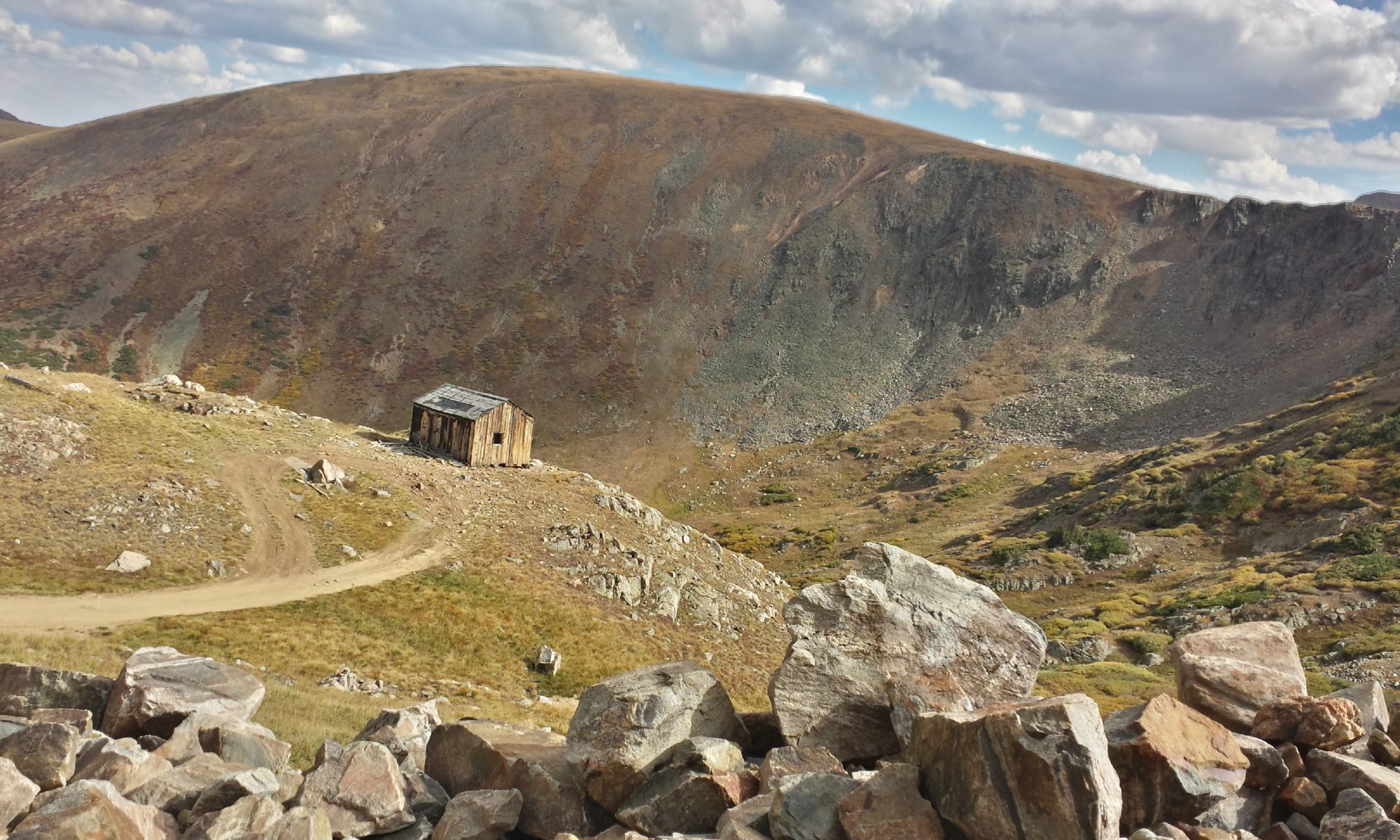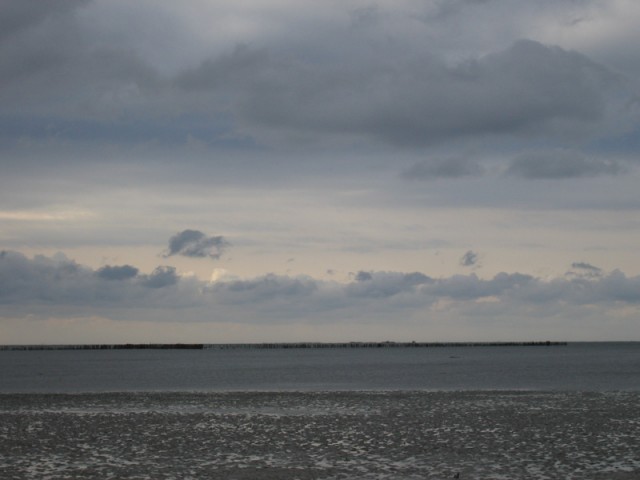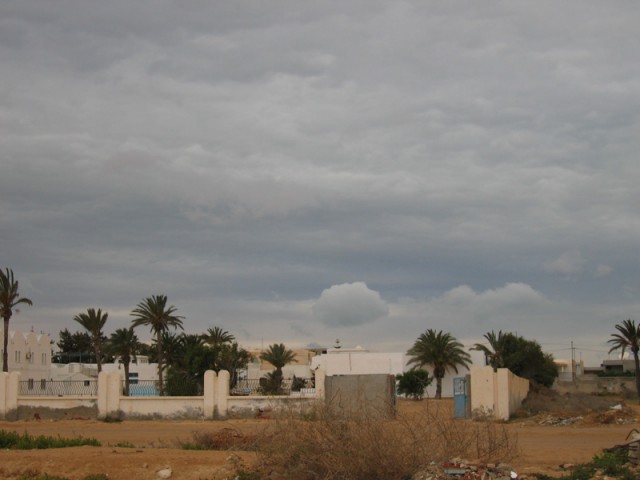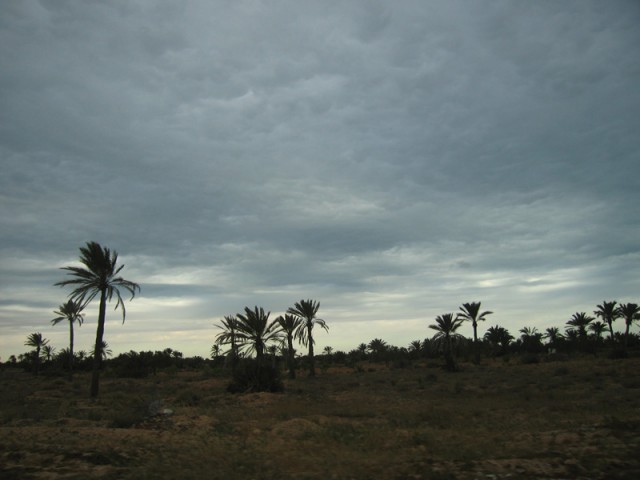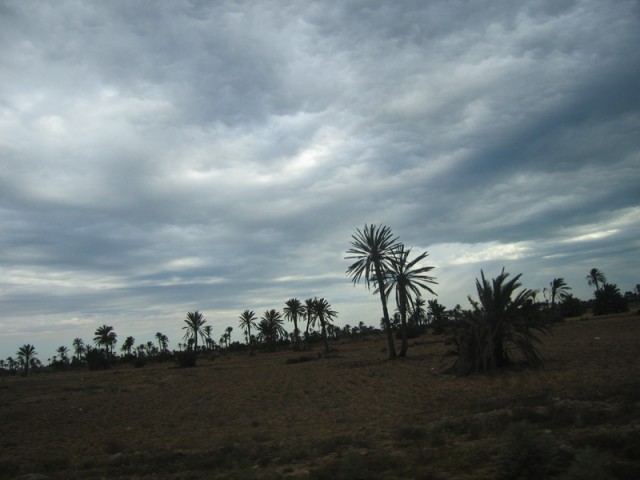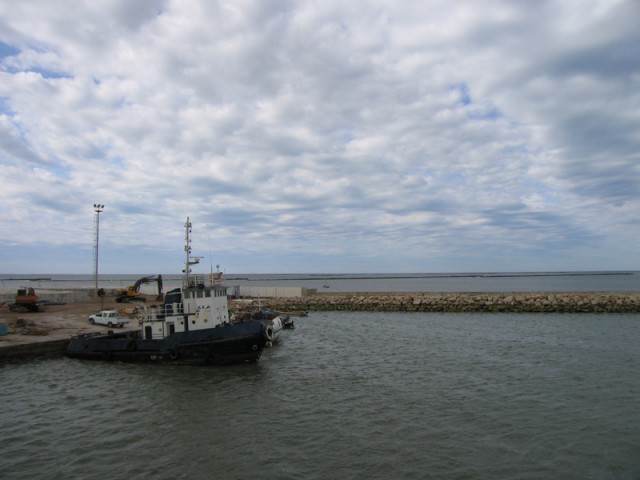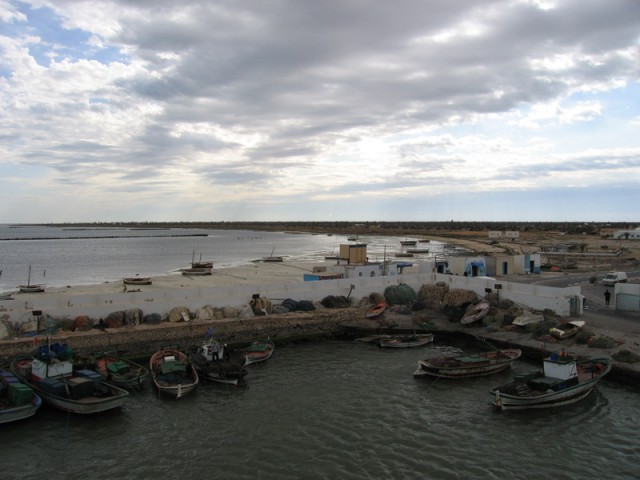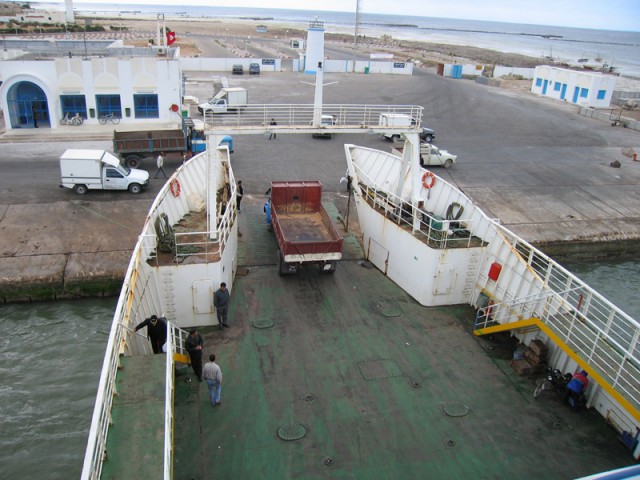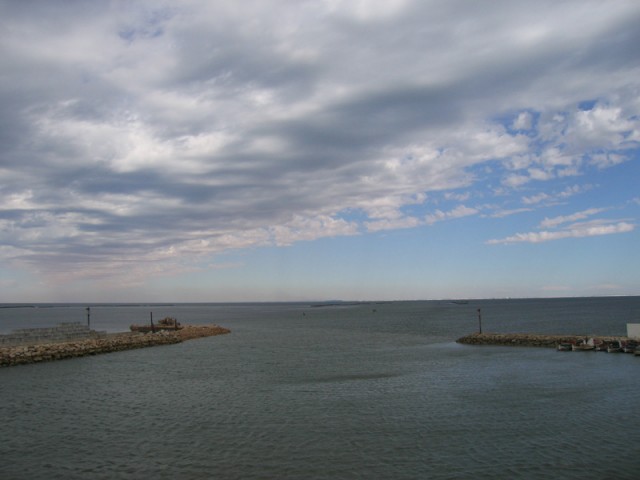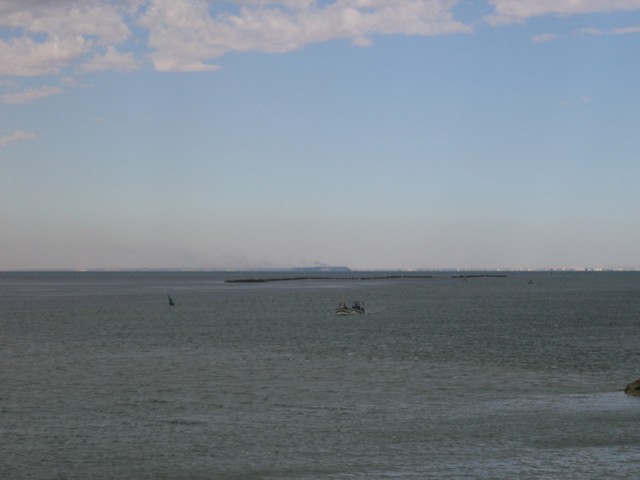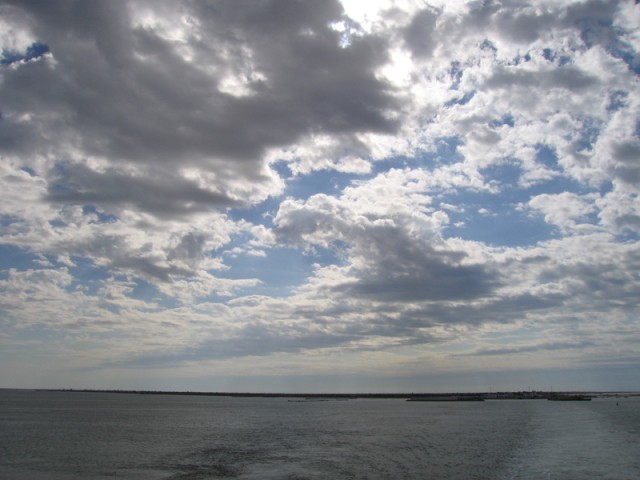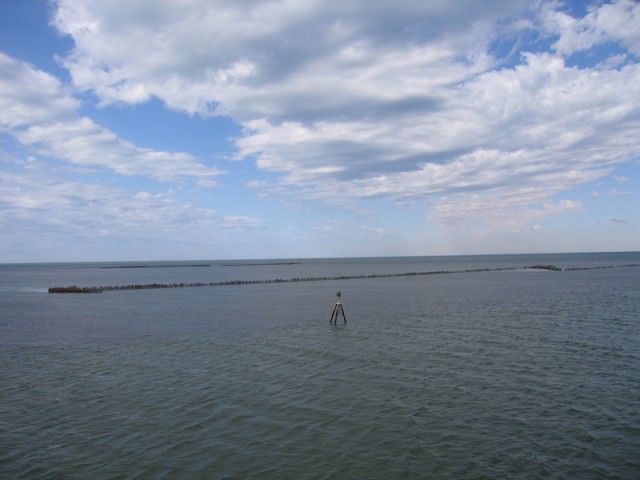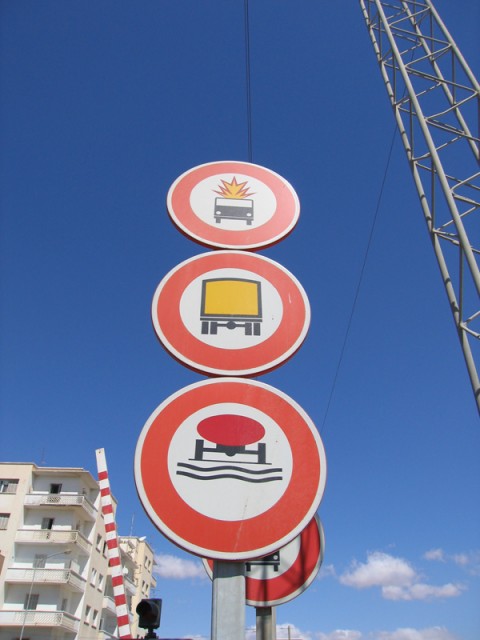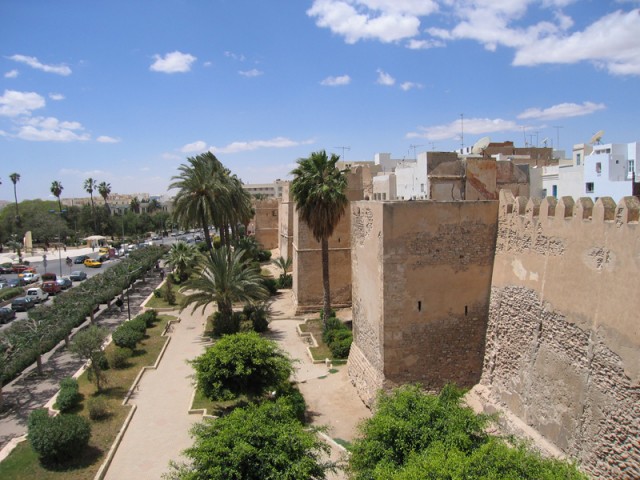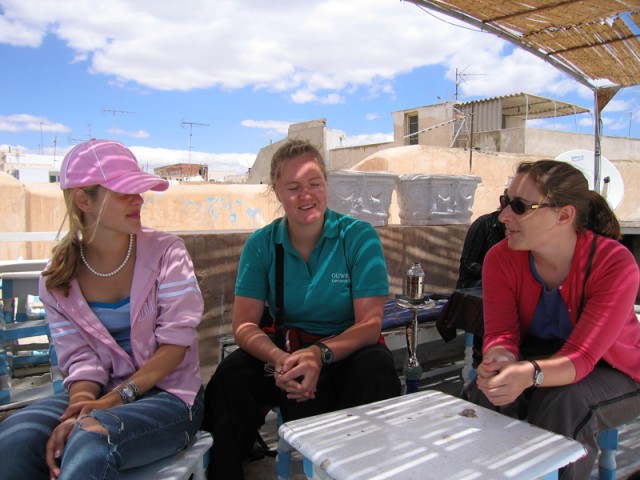On the same weekend as my Kerkennah foray, I also visited Makthar 300 kilometers and two louage rides away. I was very lucky to get to Makthar at all without being stuck in Kairouan or some other point in between as it was already rather late in the day, having spent most of the day in Sfax at the Libyan consulate trying to arrange for a visa to travel to Libya. That visa never did happen although I was vigorously informed by all of the Libyans I met how much they loved America and Americans and how good of friends Kadafi and Bush are. Too bad all that friendship and love didn’t get me a visa. One of these days I’ll make it to Libya. One of these days…
Anyway back to Makthar. I finally made it to Makthar at around 5pm. It took me about two hours to tour the entire site from top to bottom. It seems Makthar rarely gets tourists. It’s rarer still to see a single lone American male that speaks arabic out there. As I looked through the excellent little museum at the site the National Guard was scrambled to provide security for me at the site. They dropped off several men to clear the entire site of old women harvesting Esparto Grass and their very young grand kids playing at their feet. I was assigned a guard named Mohammed for the duration of my visit who followed me around from about 20 paces at first.
Mohammed was very shocked to discover that, in fact, I could speak his language and that, yes, I was interested in talking to him. It turns out that Mohammed is about 27, from somewhere near Hammamet on the coast, has been in the National Guard since he turned 20, and lives in the National Guard Barracks at Makthar for 30 days at a time with about 5 or so days off every month to go back and visit his family. I asked him about transportation options to get out of Makthar, where, as the guidebooks put it, the only hotel was also the brothel (Mohammed confirmed that), and get to a larger town with a few hotels. Mohammed said that there weren’t any more louages that day and that he didn’t think there were any busses but he would love for me to stay with him in the barracks that night and we could share a meal with a family he knew in Makthar etc etc… I might have accepted him on his offer but I really wanted to get to Le Kef in order to make a bid at seeing another site the next day.
In the end, the site manager showed me where the bus stop was and said that there should be a bus to Kasserine where there were at least a few hotels at some point that night. He gave me his telephone number and said if the bus didn’t come, which sometimes happened, to call him and I could stay with his family for the night. I ended up catching that bus to Kasserine.
I got to the main bus and louage depot in Kasserine at dusk. All of the louages had already left for the night. The nearest hotel, the prison-like youth hostel, was over three kilometers away and the taxis looked hungry. I asked a man at the station if there were any more busses that night. In fact, there was one bus that would depart in two or three hours, and for all places, Tunis! I decided to take this bus.
I settled down for a several hour wait outside the bus station in Kasserine. Over the course of those few hours the stars came out, some soldiers came to wait for the bus, and the little cafe run by a man and his Downs-Syndrome plagued assistant closed down for the night.
At about 10pm one of the men sitting next to me asked for the time, in Arabic. I was wearing my little black skull cap that I bought in Tunis to keep my ears warm. We soon struck up a conversation that carried on for a good 30 minutes until the bus showed up. As we were getting ready to get on the bus he said (in Arabic) “So… You aren’t from Tunisia, are you? You’re Algerian!” and I said, much to his utter astonishment “No, I’m American.” He sat in the front of the bus and I never saw him again. I sat in the back of the bus with the soliders on their way to Tunis. I paid my fare, settled into my seat, pulled my cap down over my eyes, and drifted off to sleep to the reassuring roar of the diesel bus engine.
Around 1 AM I briefly regained consciousness to realize that we were entering Le Kef. I didn’t realize that the bus ran through Le Kef. Instead of making the straight shot to Tunis, we got the scenic night tour of a good chunk of the upper part of the country. I drifted back to sleep.
Something was jabbing my face. What was all that noise? Light suddenly flooded into my vision as my cap was pulled up above my eyes by the muzzle of a loaded AK-47. Sounds became clearer. Things came into focus. An overzealous National Guard officer had an AK-47 pointed squarely between my eyes and was shouting at me in Arabic something along the lines of “Okay you Algerian scum! Show us your papers or your head will go missing!”
I fished the photocopy of my passport out of my left pocket and handed it to the officer. He stormed off the bus after collecting a few other passengers identifications. After a few minutes he came back on and asked, in French, for my passport. I handed him my passport. He was visibly shaken when he saw the golden eagle stamped in the cover with the words UNITED STATES OF AMERICA neatly typed underneath. Evidently not very many foreigners from outside the Maghreb and certainly not very many Americans ride the night bus to Tunis.
He left again. After about ten minutes a different and more senior officer came onto the bus and started handing back ID’s. Mine was the last. He said “Enjoy your stay in Tunisia” to me in French. I put my passport back in my pocket, pulled my skull cap back down over my eyes and went back to sleep as the bus pulled away from the roadblock.
Again I felt something jabbing into my face. It was cold and felt like steel. More light. Oh not again. As I feared before I even opened my eyes or made a clear distinction of the sounds around me, I was staring down the barrel of another AK-47 being pointed at my temple by yet another fine officer of the Tunisian National Guard. Again, he yelled at me in Arabic. This time it was something like “Give me your papers! Algerian! Wake up or die! Give me your papers!” I handed him my passport straight off this time, not wanting to delay the bus any more than necessary. The AK lowered very fast when he saw that blue passport with the golden lettering and seal. He seemed a bit bemused by his recent assumption that I was an Algerian. He left the bus.
Ten minutes later he came back on the bus and handed me back my passport saying nothing. I looked out the window as we pulled away. Across the road a small 1970’s era Renault R4 pickup was pulled over to the side with three people standing outside in the glare of the headlights of a large National Guard land cruiser. A guardsman had a rifle trained on the little group while another radioed back to headquarters with a whole stack of papers laid out on top of the hood of the land cruiser. In the back of the pickup several dozen sheep waited quietly. It seems I wasn’t the only one getting the full treatment that night. I drifted back to sleep.
I woke up with a start when the bus engine died. I pulled my cap up and peaked outside the window. A few small streaks of orange blazed across the sky. It was about 4:30 AM. I had no clue where we were. I asked one of the military men sitting near me where we were in Tunisian dialect Arabic. This was the first time I had spoken since I got on the bus. Never during the two muzzle incidents had I uttered a word. The man stared back at me, not comprehending his own mother tongue. I asked again followed quickly by asking in French if he spoke Arabic. He suddenly realized that, in fact, I spoke Arabic. A grin broke out across his face and he told me “We’re in Tunis at the Bab Saadoun bus terminal.” I said thanks and told him good morning. I got off the bus and walked the four kilometers to my house as dawn broke over Tunis.
It had been an eventful weekend.
The amphitheater.
The Forum.
A triumphal arch on the other side of the Forum. This is where I met Mohammed.
A Roman board game found at many of the Roman sites in Tunisia.
The main baths complex.
Burial chambers from Numidian times. It appeared they had been reused during Roman times as storage rooms.
A public plaza. Maybe another Forum was built here or maybe this was the market or maybe there are temples waiting to be discovered around the perimeter. Much archeological work remains to be done at Makthar.
All roads lead to Rome.
A smaller baths complex.
Some old women harvesting esparto grass for use in basket and mat making that escaped detection by the National Guard. Mohammed kept a close eye on them as I passed by. They obviously were an imminent threat to my safety and security.
The remains of what appears to be either a stone play-pen for a toddler or a flower planter.
A parting shot across the waving fields of esparto grass.
